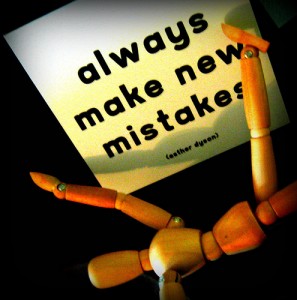
Image Credit
Did you know that I’m perfect? Well, ok, so I’m not really perfect. However, I’d be willing to bet that you are not perfect either. What this means for both of us is that during our next negotiation despite all of the clever negotiation styles and negotiating techniques that we’ve been using, there is a very good chance that we are going to make one or more mistakes. It’s what we do when we realize that we’ve made a mistake that really counts.
What To Do When You Make A Mistake
I believe that we all know the feeling. There you are in a negotiation and you’ve been very carefully explaining your position and what you want to get out of the negotiations to the other side of the table. This is just about the time that a sinking feeling occurs to you: is it possible that you were wrong about something?
The next step for most of us is that we sort of slow down. We ponder what we’ve been saying. All too often this is the time that we then realize that yes, we’ve made a mistake. Now the big question that we need to deal with is what should we do now?
Clearly you have two different paths you can take: the first is to ignore your error and hope that the other side didn’t see it. As the discussions go on, you can try to change what you are asking for and play it off like it is what you always wanted. Or you can admit that you made a mistake. Owning up to making a mistake is much harder to do.
Why Admitting Your Mistake Is So Important
As difficult as it is to tell the other side that you’ve made a mistake, it turns out that in the long run, this is the right thing to do. So how is the other side of the table going to view you when you tell them that you’ve made an error regarding something that you’ve been negotiating with them about?
The answer just might surprise you. When we admit that we’ve made a mistake, more often than not, the other side of the table will see it as an indication of the strength of our character. The human tendency in this case is to forgive.
What many of us don’t realize when we make a mistake is that the other side of the table will often readily accept a change in the direction of the negotiation when we admit that we’ve made a mistake. What this means for you is that owning up to a mistake can turn out to be a powerful negotiating tool.
What All Of This Means For You
Someday, when we are all perfect, we won’t make any mistakes. However, that day is not yet here and so we do make mistakes. When we realize that we’ve made a mistake during a principled negotiation, we need to decide what we want to do next.
The correct thing to do is to admit to the other side of the table that you have made a mistake. By doing this you will be showing them the strength of your character – you are willing to admit when you are wrong. By admitting that you are wrong, you can steer the negotiations in a new direction.
No, it’s never easy to admit it when we make a mistake. However, by being willing to own up to our mistakes, we gain credibility with the other side of the table and may even be able to control the direction of the negotiations. Next time you make a mistake, own up!
– Dr. Jim Anderson
Blue Elephant Consulting –
Your Source For Real World Negotiating Skills™
Question For You: If you make more than one mistake in a negotiation, do you think that you should admit to all of the mistakes that you’ve made?
![]() Click here to get automatic updates when The Accidental Negotiator Blog is updated.
Click here to get automatic updates when The Accidental Negotiator Blog is updated.
P.S.: Free subscriptions to The Accidental Negotiator Newsletter are now available. Learn what you need to know to do the job. Subscribe now: Click Here!
What We’ll Be Talking About Next Time
Every negotiation must come to an end sometime no matter what negotiation styles or negotiating techniques are being used. However, just exactly when it needs to wrap up is where there may be some disagreement. In order to help a negotiation wrap up sooner rather then later, often times a deadline gets thrown into the mix. What’s a negotiator to do when all of sudden you have a deadline to deal with?
